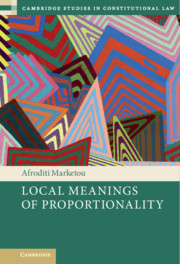Book contents
- Local Meanings of Proportionality
- Cambridge Studies in Constitutional Law
- Local Meanings of Proportionality
- Copyright page
- Contents
- Acknowledgements
- 1 Proportionality as a Cultural Practice
- Part I Questioning the Success of Proportionality
- 2 Proportionality in French Public Law: Plus Ça Change, Plus C’est la Même Chose
- 3 Proportionality in English Public Law: Continuity and Change
- 4 Proportionality in Greek Public Law:
- Conclusion of Part I
- Part II Great Expectations
- Part III European Integrations
- Conclusion
- Bibliography
- Index
3 - Proportionality in English Public Law: Continuity and Change
from Part I - Questioning the Success of Proportionality
Published online by Cambridge University Press: 08 July 2021
- Local Meanings of Proportionality
- Cambridge Studies in Constitutional Law
- Local Meanings of Proportionality
- Copyright page
- Contents
- Acknowledgements
- 1 Proportionality as a Cultural Practice
- Part I Questioning the Success of Proportionality
- 2 Proportionality in French Public Law: Plus Ça Change, Plus C’est la Même Chose
- 3 Proportionality in English Public Law: Continuity and Change
- 4 Proportionality in Greek Public Law:
- Conclusion of Part I
- Part II Great Expectations
- Part III European Integrations
- Conclusion
- Bibliography
- Index
Summary
This chapter presents the story of how proportionality became a core concept in English public law. This is a story of continuity and change. It is only since its connection to European law during the 1980s that proportionality acquired conceptual autonomy and was distinguished from the common law concept of reasonableness. While its application in domestic judicial review was rejected during the 1990s, the promoters of proportionality sought continuity between the common law and European human rights standards, among them proportionality. Since the incorporation of the convention in the domestic sphere, proportionality applies as a different head of review from irrationality. As a prong-structured test, it is very akin to the global proportionality model and it involves a significant extension of judicial powers. Still, the doctrine of deference ensures that the role of courts remains different from the one ascribed to the primary decision-makers.
Keywords
- Type
- Chapter
- Information
- Local Meanings of Proportionality , pp. 75 - 104Publisher: Cambridge University PressPrint publication year: 2021



